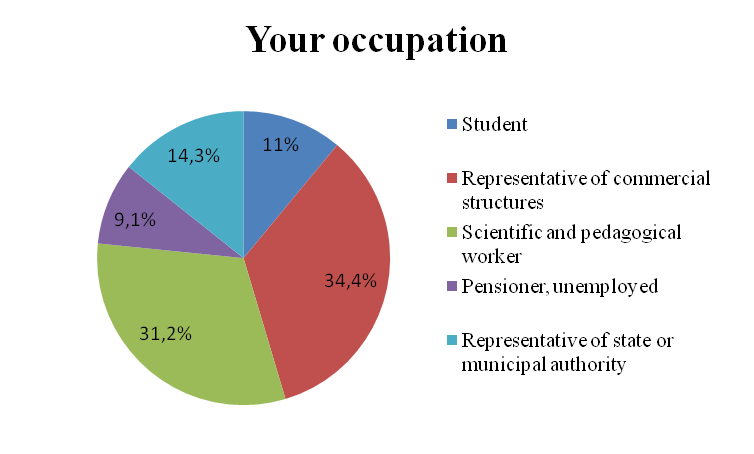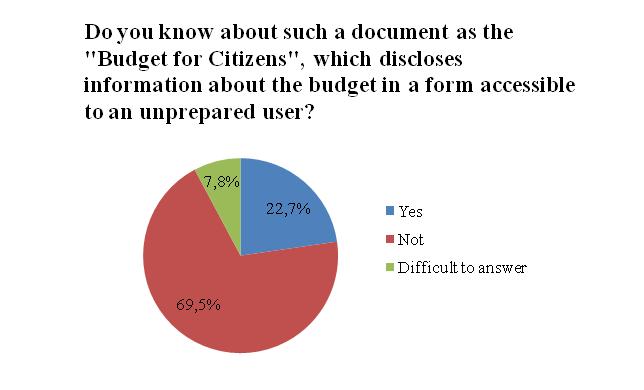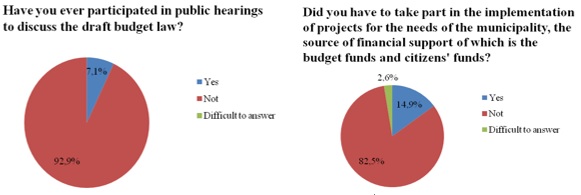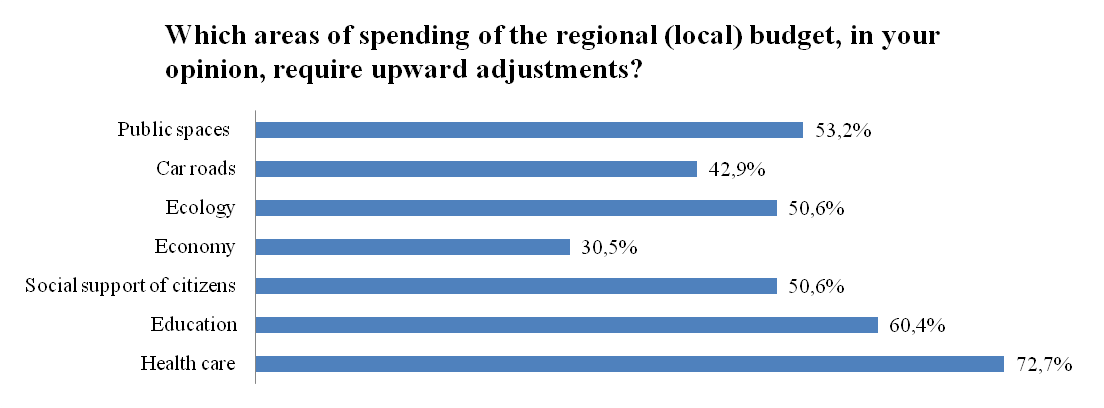Abstract
The development of public administration in Russia determines the need to increase the level of citizen involvement in this process. So, the movement of public financial flows should be controlled not only by participants of the budget process, but also by the society. The purpose of the study is to assess the level of awareness of citizens and of their involvement in the process of managing the movement of public financial flows. In the process of the study, a group questionnaire method involving Google Docs was used. According to the results of the questionnaire (1580 citizens from 13 regions of the Russian Federation), despite the formation of an extensive regulatory field focused on ensuring the openness of the budget system of Russia and the development of tools designed to ensure the availability of budget information for all interested parties, the level of citizens' awareness and their involvement in the process of control of the public financial flows movement remain low. Instruments aimed at increasing the level of citizen involvement in managing the movement of public financial flows and publicity of management are used formally, mainly to meet the requirements of ensuring the openness of the budget adopted in the international community. Expanding the list of participants in the budget process by including civil society representatives in it and developing instruments for public management of public finances will increase the level of national consensus when choosing strategic development goals and citizens' trust in the activities of the government and state institutions.
Keywords: Citizens budgetcivic engagementopen budgetpublic financepublic management of public finance
Introduction
Modern global development trends are characterized by the intensification of globalization processes, the erasing of economic and social borders, and the strengthening of interethnic communication due to the rapid development of information and telecommunication technologies (hereinafter – ITT).
The rapid growth of ITT has allowed all subjects of socio-economic relations to switch to fundamentally new ways of obtaining information and knowledge, which served as the beginning of the formation of an information society based on technological innovations. Drucker (1999) claimed that “the transition to a knowledge-based society would fundamentally change its power structure. Power and control will gradually shift from owners of capital to those who have knowledge, information and effective technologies for their use” (p. 95).
The development of ITT has had a significant impact on the activities of public authorities. ITT have gained particular importance in the field of managing the movement of public financial flows, ensuring the accountability of government activities to civil society (Fadeykina, Clushakova, Mikhailov, & Tsygankov, 2016; Gray, 2015). Today, the activities of all participants in the budget process, and, in particular, the treasury systems of the countries of the world, are based upon the widespread use of ITT (Tandberg, 2005; Potter & Diamond, 2000; Hashim & Moon, 2004), which made it possible to ensure proper control over the movement of funds of the centralized money funds.
In 2003, in Geneva, at the World Summit on the Information Society, a Declaration was adopted (Declaration WSIS, 2003), which reflected 67 principles for building the information society. In the Declaration, in particular, it was said that in order to create an information society open for all, new forms of solidarity, partnership and cooperation between government bodies and other interested parties, that is, the private sector, civil society and international organizations, are required.
To this day, for many states, the problem of low confidence of citizens in the activities of governments and the state institutions created by them remains an urgent one. Particularly acute is the question of the proper use of centralized funds, which, judging by their content, are of a public nature.
Problem Statement
At a conference in Washington in January 2011, an initiative was launched to create a new international organization – the Open Government Partnership (OGP), thanks to which 79 OGP member countries and 20 subnational governments have made over 3.100 commitments to make their governments more open and accountable to civil society.
In his message to the Federal Assembly of the Russian Federation, President D. Medvedev announced his intention to switch to an open government format, the main purpose of which was to unite all levels and branches of government, public figures, experts, in other words, everyone who was ready to participate, to solve strategic and tactical tasks in the processes of actual government management. In February 2012, according to the Decree of the President of Russia, a working group was created to formulate proposals on the creation of an open government in the Russian Federation. The same year Russia joined other countries participating in the OGP Partnership.
In 2013, at the international summit of the G8 group, a landmark document was adopted – the G8 “Open Data Charter”, which justified the need for public disclosure of information by the government agencies on the Internet. The Charter, in particular, indicated that providing access to government data could give individuals, the media, civil society and business an opportunity to contribute to improving the performance of public services. In January 2014, by Decree of the Government of the Russian Federation No. 93-r, the Concept of openness of federal executive bodies was approved, and in December of the same year, according to the conditions for participation in OGP, an action plan for the implementation of the Open Data Charter, called "Open Data of the Russian Federation" was developed (The Plan of Activities, 2014).
In the budget message “On budget policy in 2013-2015”, the President of Russia noted that it is necessary to give public finance management a fundamentally new content, not just in words but in practice, to ensure maximum transparency of this process for civil society. To solve this problem, the Government of the Russian Federation was instructed to develop guidelines for presenting budgets of all levels and reports on their implementation in an informative and compact form that is accessible to an unprepared user (Sinkina & Fadeykina, 2015).
Awareness of the need to ensure transparency in the movement of public financial flows came to most countries with a high level of socio-economic development much earlier than to Russia (Garrett & Vermeule, 2006). In 2007, experts from the International Monetary Fund developed a document called Guidance on Fiscal Transparency. The Guidance included the "Code of Good Practices on Fiscal Transparency". Section III, “Accessibility of information to the public” of the Guidelines, indicated that a clear and simple consolidated budgetary guide should be distributed at the same time as the annual budget.
According to the methodological recommendations of the Ministry of Finance of Russia on the presentation of budgets in a form which is accessible to an unprepared user, the budget for citizens should be drawn up to the draft of the budget law, the budget law and the budget execution law. It is recommended to use the budget for citizens during public hearings on the draft budget of the constituent entity of the Russian Federation and the annual report on its implementation, as well as during events aimed at the implementation of initiative (participatory) budgeting projects. This public management tool in the public sector has recently begun to be applied in our country. With the support of the World Bank, the “Operational Guide for Initiative Budgeting Practices: An Example of a Program for Supporting Local Initiatives” was published under the Project “Development of Initiative Budgeting in the Russian Federation in 2016-2018” (Khachyatryan, Shulga, Gridin, & Sukhov, 2016), which describes the principles, mechanisms, procedures and methodological base of initiative budgeting. In general, the participatory budgeting mechanism is focused on solving, by the initiative of citizens, the most acute (mainly infrastructural) issues of local importance and suggests their direct participation in discussing the distribution and use of budget funds (“The report of the best regional …”, 2019).
For the first time, the “Open Budget” was posted on the website of the Ministry of Finance of Russia in 2012 along with the draft Federal Law “On the Federal Budget for 2013 and the planning period of 2014 and 2015”. However, two years later, the budget structure for citizens underwent significant changes in connection with the transition to program-targeted principles of budget planning. Information on the budget law was structured in the context of the program blocks “New quality of life”, “Innovative development and modernization of the economy”, “Balanced regional development”, “Effective state”.
At the regional level, the process of preparing and presenting the budget for citizens began in 2013. Initially, only 46 of the 83 subjects of the Russian Federation were involved in this process. Information about the budget was characterized by a low level of visualization, informational content and was difficult to understand. However, the involvement of an increasing number of constituent entities of the Russian Federation in this process was quite natural, since the task of ensuring the availability and understand ability of budget information was set to the Government of the Russian Federation personally by the President. In 2014, the budget for citizens was presented by 77 subjects of the Russian Federation. The vast majority of subjects of the Russian Federation (64 out of 77) presented this information in the form of brochures, and only 13 published it on the Internet portals of financial authorities.
According to approaches to the classification of openness of budget information used by the International Budget Partnership (https://www.internationalbudget.org), in 2014, 32 subjects of the Russian Federation provided extensive information on the budget, 32 provided significant information and 13 – limited.
According to the results of monitoring of the best practices for the development of the “Budget for Citizens” in the subjects of the Russian Federation and municipalities for 2017, which is conducted annually by the Ministry of Finance of the Russian Federation, 80 constituent entities of the Russian Federation form the budget for citizens by the three stages of the budget process. In 2014, there were only 7 of such subjects in the Russian Federation.
The budget for citizens is published on the official websites of financial authorities and (or) is distributed in the form of printed brochures. In 2017, 44 subjects of the Russian Federation provided a budget for citizens in two formats – print and interactive, which seems fair due to the fact that the level of computer literacy of the population is highly differentiated. The complete information on the main budget parameters in an accessible format for citizens in 2017 was provided by 43 subjects of the Russian Federation (in 2014 there were 19 of such subjects of the Russian Federation).
Particular attention is paid to the results of the implementation by executive authorities of the sub-federal level of the decrees of the President of the Russian Federation adopted on May 7, 2012. The indicators reflected in these documents are considered by many representatives of the scientific community as key national indicators. Therefore, one of the directions of information disclosure in the “Budget for Citizens” is the implementation of the May decrees of the President of the Russian Federation. In 2017, detailed information in this context was presented in the budgets for citizens by 63 subjects of the Russian Federation.
One of the tasks of preparing and publishing budgets for citizens is the disclosure of information about the budget in the context of various target groups. According to the monitoring results of the Ministry of Finance of Russia in 2017 in 70 subjects of the Russian Federation, the budget for citizens was presented in the context of 5 or more target groups (in 2015 there were only 9 of such regions).
One of the evaluation criteria in the framework of the monitoring conducted by the RF Ministry of Finance is the availability of perception of budget information. According to experts of the Ministry of Finance of the Russian Federation, budgets for citizens of 54 subjects of the Russian Federation met this criterion in 2017.
The level of visualization of budget information is another criterion by which experts of the Ministry of Finance of Russia evaluate published budgets for citizens. In 2017, 78 out of 85 subjects of the Russian Federation provided a high level of visualization.
In general, a consolidated assessment of the results of monitoring of the best regional and municipal practices showed that, despite the involvement of the vast majority of subjects of the Russian Federation in the process of providing information about the budget in an accessible and understandable form for an unprepared user, only the basic amount of information is published on the official websites of financial authorities in 3 subjects of the Russian Federation in the form of the budget information for citizens. Among them are the Kemerovo region, the Jewish Autonomous Region and the Republic of Ingushetia. However, despite the internal problems and contradictions associated with the management of public finances, the international community was forced to recognize an increase in the level of openness of the budget process in the Russian Federation. Thanks to the efforts of the Ministry of Finance of the Russian Federation and key participants of the budget process, primarily the chief administrators of budget funds at the federal and sub-federal levels and the Federal Treasury, Russia in 2012 was included in the TOP-10 countries in terms of budget openness, the budget openness level of which, according to the rating “The Open Budget Index” has been classified as extensive. Unfortunately, over time, Russia could not maintain this position. In 2017, Russia took 15th place in the Open Budget Index, scoring 72 points out of 100 possible, and the budget disclosure level was rated as significant (The Open Budget Survey, 2017).
Research Questions
A legitimate question arises. How in demand are the instruments recommended by the International Monetary Fund to ensure transparency in the financial and budgetary sphere by Russian citizens?
Purpose of the Study
The purpose of the study is to assess the level of citizens' involvement in the process of managing the movement of public financial flows and their awareness of public finances.
Research Methods
As part of the scientific study, the authors conducted a group questionnaire survey of citizens living in the Russian Federation. The survey was devoted to assessing the level of awareness of citizens about public finances, their involvement in the process of managing the movement of public financial flows. 1580 citizens from 13 regions of Russia took part in the survey.
Respondents were asked to answer 12 simple questions:
1. Region of residence.
2. Occupation.
3. Do you know about the document “Budget for Citizens”, which discloses information about the budget in a form which is accessible to an unprepared user?
4. Do you know the sources of the income of the regional (local) budget?
5. Do you know the directions of spending the funds of the regional (local) budget?
6. Have you taken part in public hearings to discuss the draft budget law?
7. Have you had to take part in the implementation of projects for the needs of the municipality, the source of financial support of which are budget funds and citizens?
8. Have you ever applied to regional authorities (local authorities) on the problems of socio-economic development of the region (municipality)?
9. Were the problems of socio-economic development of the region (municipality) solved after your appeal?
10. What areas of spending of funds of the regional (local) budget, in your opinion, require adjustment upward?
11. Do you know about the Unified portal of the budget system of the Russian Federation "Electronic budget"?
12. Do you know that Russia annually evaluates the quality of financial management carried out by budget administrators?
The questionnaire was implemented in electronic document format using Google Docs and distributed using various ITT (instant messengers, social networks, e-mail newsletters).
Findings
As a result of the survey, respondents (respondents of various occupations (Figure






Thus, 69.5% of respondents are not aware that information about the budget in an accessible form for an unprepared user is published on the official websites of financial authorities and is open to all interested parties, 76.6% do not know about the Unified Portal of the Budget System of the Russian Federation “Electronic budget”, 68.8% – are not aware of the fact that in Russia the quality of financial management is carried out annually by budget administrators (Figure
The respondents' suggestions regarding the increased spending of the regional (local) budget are presented in Figure

Most of the respondents surveyed agree that they require an upward adjustment in such areas of spending of the regional (local) budget funds as healthcare (72.7% of respondents) and education (60.4% of respondents).
Conclusion
The study allows us to conclude that in Russia the budget for citizens as an instrument for ensuring the transparency of the activities of state authorities and local self-government in the field of public finance, unfortunately, does not work. The overwhelming majority of the population living even in large urban districts does not have the slightest idea about the budget for citizens as a tool to ensure the information transparency of the activities of participants in the budget process.
Unfortunately, the reality is that tools aimed at increasing the level of citizen involvement in managing the movement of public financial flows and publicity of management in this area are used formally, mainly to meet the requirements of ensuring an open budget adopted by the international community.
Amending the current budget legislation, expanding the list of participants in the budget process by including representatives of civil society and developing tools to increase the degree of influence of citizens on the process of managerial decision-making in the public sector will increase the level of public agreement in choosing national development goals and priorities, as well as directions for their achievement of centralized funds.
Acknowledgments
The authors thank the management of Novosibirsk State Theatre Institute, Novosibirsk, Russia, for financial support in the publication of this article.
References
- Drucker, P. F. (1999). Postkapitalisticheskoye obshchestvo. Novaya postindustrial'naya volna na Zapade [Post-capitalist society. New post-industrial wave in the West]. Moscow: Academia. [in Russ.].
- Fadeykina, N. V., Clushakova, O. V., Mikhailov, V. V., & Tsygankov, K. Yu. (2016). About opportunities forming the effective public management system in Russia of sustainable social and economic development of the territories. International Journal of Humanities and Cultural Studies, 3(2), 535-556. [in Russ.].
- Garrett, E., & Vermeule, A. (2006). Transparency in the Budget Process. USC of Chicago, Public Law Working Paper No. 115, USC CLEO Research Paper No. C06-2, USC Law Legal Studies Paper No. C06-2, U Chicago Law & Economics, Olin Working Paper No. 278.
- Gray, J. (2015). Open Budget Data: Mapping the Landscape. Retrieved April, 4, 2019, from
- Hashim, A., & Moon, A. J. (2004). Treasury Diagnostic Toolkit. World Bank Working Paper, no. 19. Washington, DC: World Bank. Retrieved May, 10, 2019, from https://openknowledge. worldbank.org/handle/10986/15062
- Khachyatryan, G., Shulga, I., Gridin, S., & Sukhov, A. (2016). Operatsionnoye rukovodstvo praktiki initsiativnogo byudzhetirovaniya: primer programmi podderzhki mestnih initsiativ [Operational Guidelines for Initiative Budgeting Practice: An Example of a Program for Supporting Local Initiatives]. Moscow: “Alex”. [in Russ.].
- Potter, B. H., & Diamond, J. (2000). Building Treasury Systems. Finance and Development, vol. 37, no. 3, 36-39. Retrieved on April 10, 2019, from https://www.imf.org/external/pubs/ft/fandd/ 2000/09/pdf/potter.pdf
- Sinkina, A. A., & Fadeykina, N. V. (2015). Byudzhet dlya grazhdan [Budget for citizens]. Novosibirsk: Sibirskaya akademiya finansov i bankovskogo dela. [in Russ.].
- Tandberg, E. (2005). Treasury System Design: A Value Chain Approach. IMF Working Paper no.05/153. Retrieved May 3, 2019, from https://www.imf.org/external/pubs/ft/wp/2005/wp05153.pdf.
- The Open Budget Survey (2017). Retrieved April, 10, 2019, from https://www.internationalbudget.org /open-budget-survey/open-budget-index-rankings/
- The Plan of Activities “Open data of the Russian Federation” (2014). [In Russ.]. Retrieved May 23, 2019, from https://opendata.open.gov.ru/opendata/documents/
- The report of the best regional practices of developing proactive budgeting in the regions of the Russian Federation and municipalities for the period from 2015 to 2018. (2019). Retrieved May 15, 2019, from https://www.minfin.ru/ru/document/?id_4=124663 [in Russ.].
- World Summit on the Information Society. Declaration WSIS-03/GENEVA/DOC/4-R. (2003). Retrieved April 15, 2019, from http://www.un.org/ru/events/pastevents/wsis.shtml
Copyright information

This work is licensed under a Creative Commons Attribution-NonCommercial-NoDerivatives 4.0 International License.
About this article
Publication Date
31 December 2019
Article Doi
eBook ISBN
978-1-80296-076-1
Publisher
Future Academy
Volume
77
Print ISBN (optional)
-
Edition Number
1st Edition
Pages
1-1056
Subjects
Industry, industrial studies, project management, sustainability, business, innovation
Cite this article as:
Vaysberg, Y. A., & Glushakova*, O. V. (2019). On Publicity Of Public Finance Management In Russia. In I. O. Petrovna (Ed.), Project Management in the Regions of Russia, vol 77. European Proceedings of Social and Behavioural Sciences (pp. 619-628). Future Academy. https://doi.org/10.15405/epsbs.2019.12.05.76
